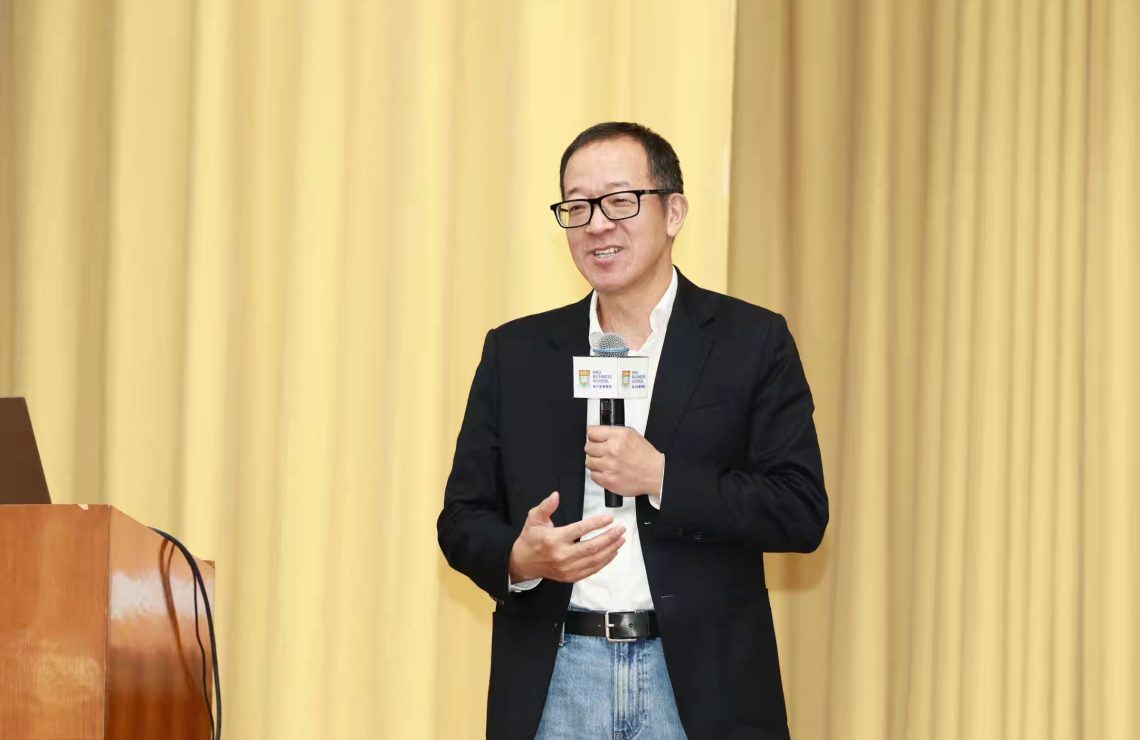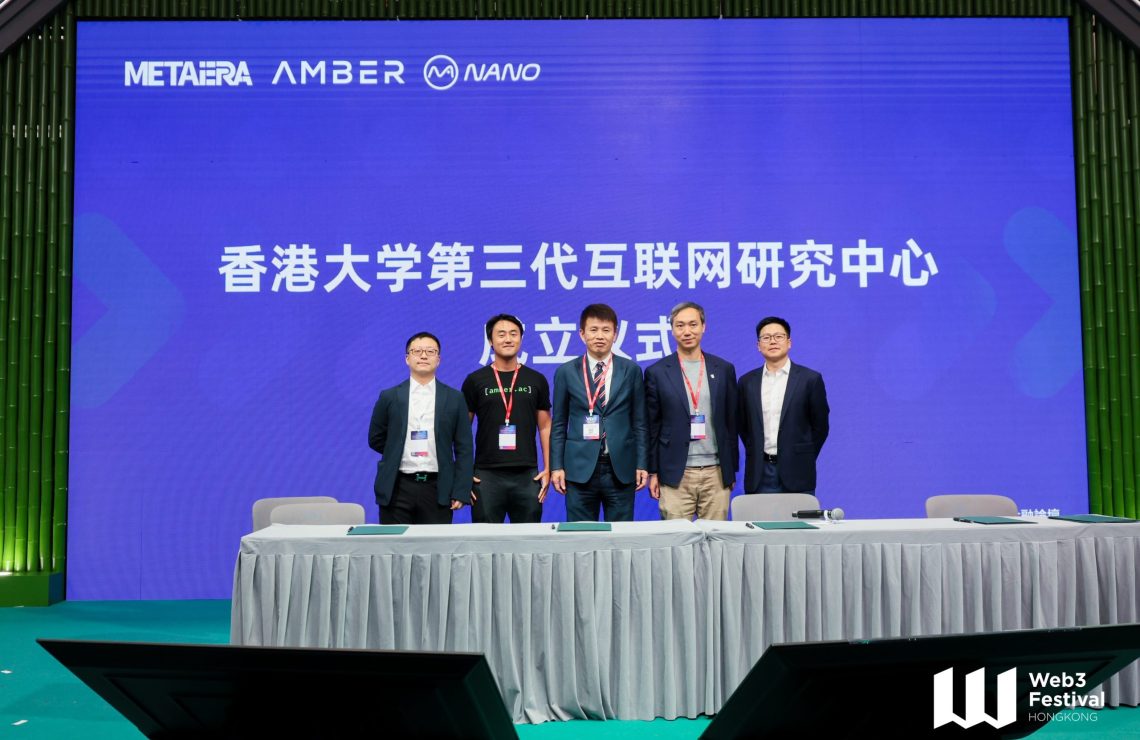HKU Business School Pilot Forum Explores New Pathways for Chinese Enterprises Going Abroad
(24 September, 2024, Hong Kong) The HKU Business School Pilot Forum – “Going Global: Exploring the Growth of Chinese Businesses Overseas”, hosted by HKU Business School, in collaboration with the International Cooperation Center of the National Development and Reform Commission (NDRC-ICC), concluded successfully on 20 September 2024. The Forum gathered esteemed business leaders and experts in the fields of globalisation and macroeconomics to explore the opportunities and challenges facing Chinese enterprises in their strategy of going abroad. Through keynote speeches and roundtable discussions, the speakers shared insights on Chinese enterprises expanding overseas footprint, their strategic initiatives in opening up new markets and examined how Hong Kong can leverage its unique advantages to develop itself into a multinational supply chain management centre, meeting the demand of Chinese enterprises operating globally. Held at HKU Loke Yew Hall, the Forum brought together a diverse audience of industry leaders, entrepreneurs and distinguished scholars, with nearly 400 people in attendance.
Professor Hongbin CAI, Dean and Chair of Economics of HKU Business School, said in his welcoming remarks, “In light of the challenges facing the Chinese economy and enterprises, hosting the Pilot Forum here in Hong Kong today is particularly meaningful for us to reaffirm the essence of entrepreneurship – just like Hong Kong’s Lion Rock spirit, which embodies resilience and courage in the face of adversity. As an international city, Hong Kong is the bridgehead for Chinese enterprises going overseas, with a rich pool of talent and resources essential for expanding into global markets. We encourage entrepreneurs to leverage Hong Kong as a platform to move beyond traditional ways of thinking and comfort zones, actively explore new ideas, and broaden their global perspectives. These will enable them to navigate the fast-changing market landscape more effectively.’’
Mr. Baozong FU, Vice Director of the NDRC-ICC, said in his welcoming remarks, “As China’s economic strength continues to grow and the global division of labour undergoes significant changes, Chinese enterprises going global is gradually becoming an essential pathway for China’s globalisation and a key direction for its economic participation in the international markets. The influence of Chinese companies abroad is also on the rise, demonstrating new characteristics, among which ‘new, distinctive, specialised and sophisticated’ enterprises are accelerating their overseas expansion. In the first half of 2024, a total of 832 outstanding listed companies in this category venturing into overseas markets, with total foreign revenue surpassing a record-high of RMB 810 billion.” Mr. FU added, “Moreover, Chinese enterprises are continuously upgrading their business expansion overseas, with domestic companies spearheading a global shift from manufacturing to technology and services. The global competitiveness of high-end manufacturing has also seen significant growth. Additionally, private enterprises have emerged as a formidable force in going global. Hong Kong, as an international trade and financial centre, is the only city that can capitalise on both China’s market advantages and Hong Kong’s international strengths. With its mature and diversified financial market as well as a rich talent pool, the city is poised to become a crucial gateway for mainland enterprises going global and for facilitating the flow of international capital to the Mainland in the future.”
The Forum was followed by inspiring keynote speeches from six distinguished speakers. Dr. Victor FUNG, Chairman of the Fung Group, Honorary Chairman of Li & Fung, Chairman of Asia Global Institute at HKU, proposed a two-phased strategy for Chinese enterprises going overseas under the speech titled “Chinese Enterprises’ Strategy on ‘Going Global’ and the Role of Hong Kong”. The first phase involves adopting an “indirect export” model to establish an export gateway in other developing countries, where factories are set up locally to process semi-finished products from China before exporting them to European and US markets. Once the local operational capacity matures, the second phase can commence by opening local markets through an “export-to-domestic-sales” approach. This process of industrial transfer can bring investment, employment, technology, and export opportunities to other countries, thereby enhancing China’s global influence and soft power. Against this backdrop, Hong Kong, with its international business network and the developing headquarters economy, has the potential to become a supply chain management centre, providing Chinese enterprises with professional services such as finance, talent training, and legal consulting.
Tan Sri Andrew SHENG, Distinguished Fellow of Asia Global Institute at HKU, Member of International Advisory Council of National Financial Regulatory Administration, Former Board Member of Khazanah Nasional Berhad, Former Chairman of the Securities and Futures Commission (SFC) of Hong Kong, focused his speech on the theme of “New Ways for Expanding Overseas Business”. He pointed out that while domestic competition is fierce in China, and European and US markets are mature with limited growth, the Global South — including the BRICS countries which account for approximately 40% of the world’s population and GDP — holds great potential for development. Furthermore, as the new era requires new financing models, Chinese enterprises going abroad can provide capital to the Global South markets, thereby enhancing workforce training and helping these regions achieve higher income levels.
Ms. Marjorie YANG, Chairman of Esquel Group, delivered a speech titled “It’s Time to Set Sail,” highlighting that the significant changes in the global political and economic landscape present opportunities for enterprises to upgrade and transform towards high-quality development. In the face of a looming global resource crisis stemming from rapid economic growth, if companies can effectively leverage technology to develop automation and digitalisation, and flexibly utilise the technological capabilities and talent resources accumulated domestically, they can create immense value for both their enterprises and the industry, while also promoting sustainable development.
Mr. Bin QI, Executive Vice President and Deputy Chief Investment Officer of China Investment Corporation, pointed out in his keynote speech, “Unite Global Partners for Chinese Companies to Go Global,” that Chinese enterprises face numerous challenges when expanding their business overseas. It is essential for companies to uphold the principles of mutual benefit and win-win cooperation, establish trustworthy relationships with international enterprises and financial institutions, collectively address the challenges of globalisation, and further leverage Hong Kong’s role as an international financial centre to engage with the world.
Professor Huiyao WANG, Founder and President of Center for China and Globalization (CCG), Former Counselor to the State Council of China, addressed the topic of “Reglobalisation: Opportunities and Challenges”, emphasising that Chinese enterprises should adopt a macro perspective on international relations, climate change, and other global governance issues when expanding globally. As China enhances its relations and cooperation with foreign countries, Hong Kong should adopt a more open-minded approach to fulfill its role as a “super-connector”.
Professor Heiwai TANG, Associate Dean (External Relations) of HKU Business School, Director of Asia Global Institute at HKU, pointed out that globalisation is becoming more regionalised, service-oriented, and digitalised when discussing the topic “Breaking Barriers: The Journey of Chinese Enterprises Going Global”. Under the influence of geopolitical factors, the focus of Chinese enterprises going global will shift towards the Global South markets. Therefore, it is crucial to take cultural differences and localisation into consideration.
Two roundtable discussions were also conducted during the Forum, focusing on Hong Kong’s role as a Multinational Supply Chain Management Centre and its contributions to promote Web3 and digital transformation. In the roundtable titled “Building Hong Kong as a Multinational Supply Chain Management Centre,” speakers emphasised that localisation is the key to going global successfully, which includes understanding local authorities and regulations, collaborating with reputable local partners, and hiring local talent. They also highlighted that Hong Kong’s strengths lie in its robust international network and bond market, which play a crucial role in facilitating the internationalisation of the Renminbi. In the second roundtable, titled “Repositioning Hong Kong for New Growth Opportunities Globally,” speakers noted that Hong Kong can provide an efficient, real-time, and transparent platform for financial infrastructure to support Chinese enterprises in developing cross-border trade and payments. Additionally, it can integrate supply chains with blockchain technology, utilising smart contracts to accelerate and enhance verification processes, thereby continuing to leverage its advantages as an international financial centre.
The HKU Business School Pilot Forum is the extension of the HKU-ICC Programme. The programme is jointly launched by HKU Business School and the NDRC-ICC. Through thematic courses, in-depth visits, joint research, problem-solving and result-sharing, the programme helps entrepreneurial participants understand the changing global landscape, align with national strategies, and foster industrial and technological innovation within the country.
Photo Caption
 Professor Hongbin CAI, Dean and Chair of Economics of HKU Business School, delivers the welcoming remarks.
Professor Hongbin CAI, Dean and Chair of Economics of HKU Business School, delivers the welcoming remarks.

Mr. Baozong FU, Vice Director of the International Cooperation Center, National Development and Reform Commission (NDRC-ICC), delivers the welcoming remarks.

Dr. Victor FUNG, Chairman of the Fung Group, Honorary Chairman of Li & Fung, Chairman of Asia Global Institute at HKU, delivers a keynote speech.

Tan Sri Andrew SHENG, Distinguished Fellow of Asia Global Institute at HKU, Member of International Advisory Council of National Financial Regulatory Administration, Former Board Member of Khazanah Nasional Berhad, Former Chairman of the Securities and Futures Commission (SFC) of Hong Kong, delivers a keynote speech.

Ms. Marjorie YANG, Chairman of Esquel Group, delivers a keynote speech.
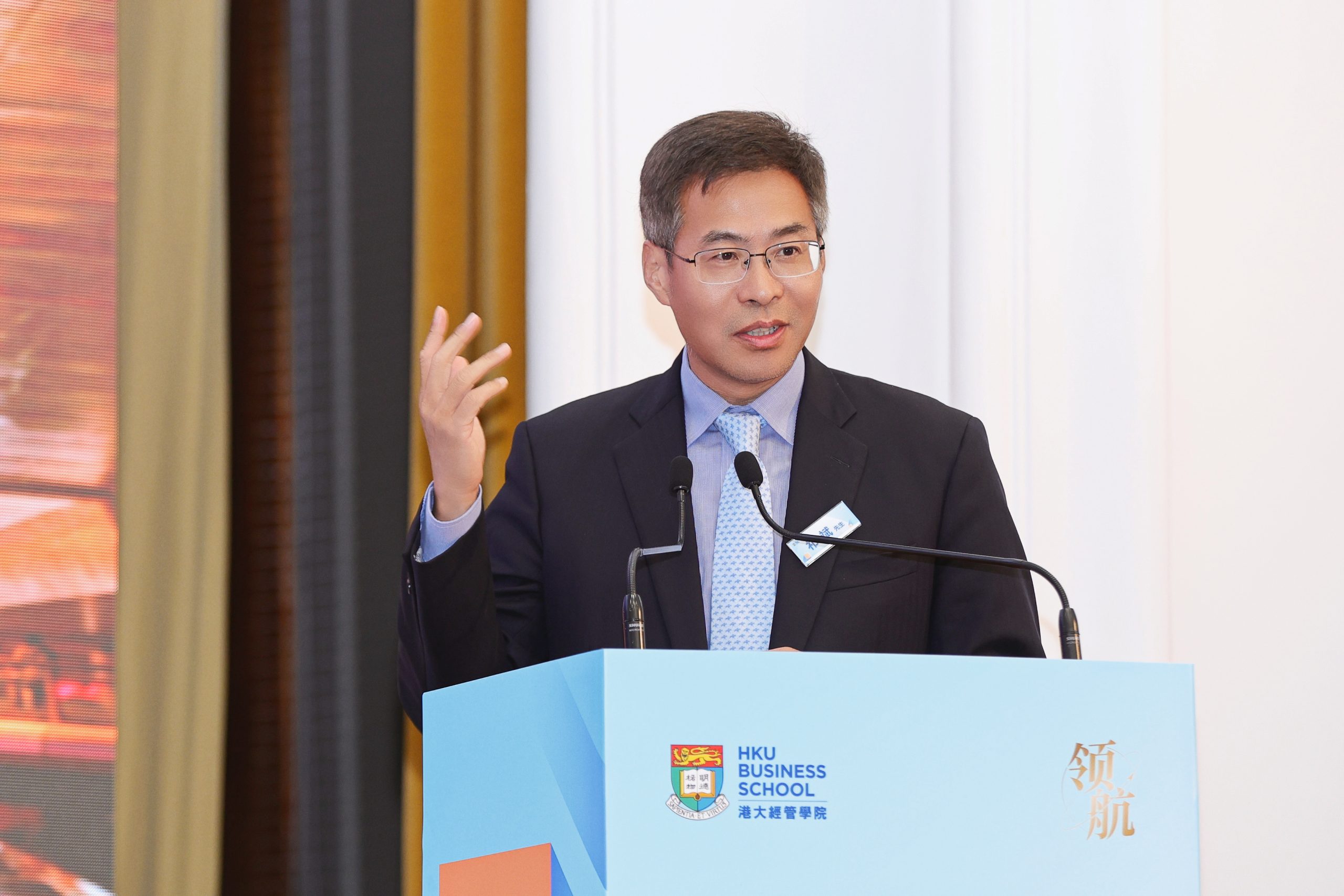
Mr. Bin QI, Executive Vice President and Deputy Chief Investment Officer of China Investment Corporation, delivers a keynote speech.
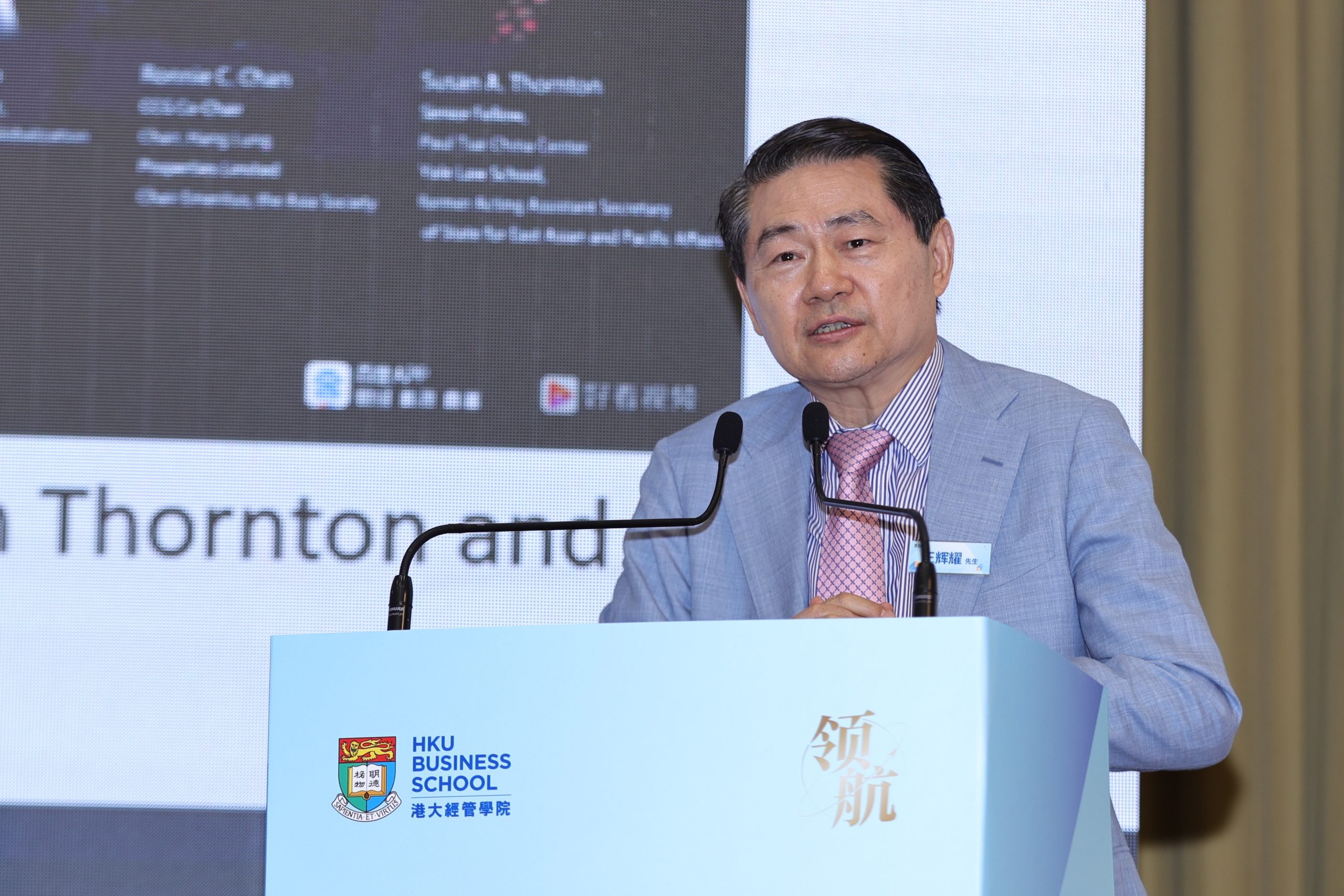
Professor Huiyao WANG, Founder and President of Center for China and Globalization (CCG), Former Counselor to the State Council of China, delivers a keynote speech.

Professor Heiwai TANG, Associate Dean (External Relations) of HKU Business School, Director of Asia Global Institute at HKU, delivers a keynote speech.
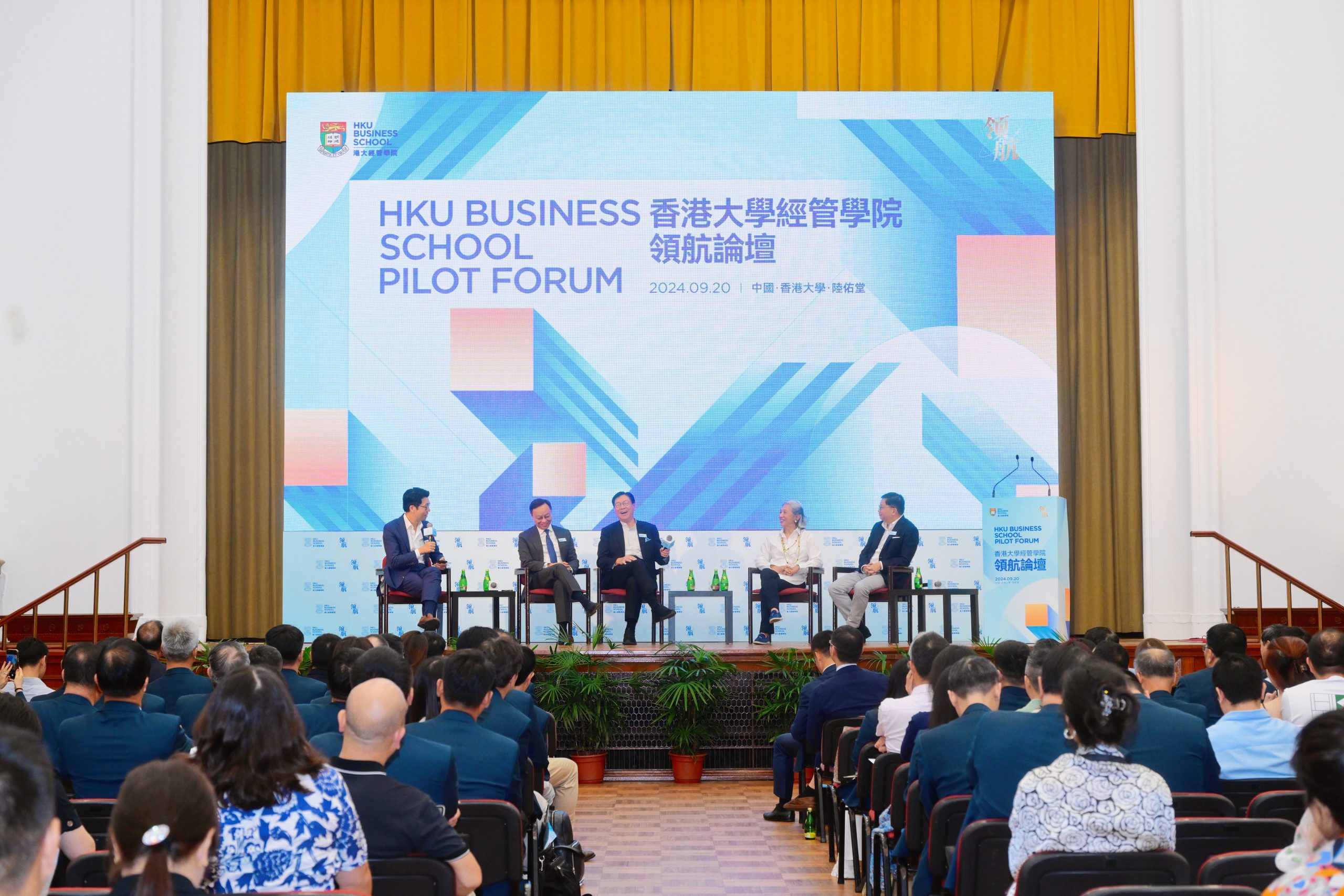
(From second left) Mr. Darryl CHAN, Deputy Chief Executive of Hong Kong Monetary Authority; Professor Frederick MA, Chairman and Independent Non-Executive Director of FWD Group, Former Secretary for Commerce and Economic Development of the HKSAR Government, Former Secretary for Financial Services and the Treasury of the HKSAR Government; Ms. Marjorie YANG, Chairman of Esquel Group; Mr. Paul LOO, Chief Operating Officer of Lalamove, participate in the roundtable titled “Building Hong Kong as a Multinational Supply Chain Management Centre”, moderated by Professor Heiwai TANG (first left), Associate Dean (External Relations) of HKU Business School, Director of Asia Global Institute at HKU.

(From second left) Professor Chen LIN, Associate Vice-President of HKU, Associate Dean (Research and Knowledge Exchange) and Chair of Finance of HKU Business School; Mr. Bin QI, Executive Vice President and Deputy Chief Investment Officer of China Investment Corporation; Mr. Baozong FU, Vice Director of the International Cooperation Center, National Development and Reform Commission (NDRC-ICC); Professor Huiyao WANG, Founder and President of Center for China and Globalization (CCG), Former Counselor to the State Council of China, participate in the roundtable titled “Repositioning Hong Kong for New Growth Opportunities Globally”, moderated by Ms. Yafang XIE (first left), Former Host of Phoenix Satellite Television.

Held at HKU Loke Yew Hall, the Forum brought together a diverse audience of industry leaders, entrepreneurs and distinguished scholars, with nearly 400 people in attendance.
Hi-res photos are available here.






